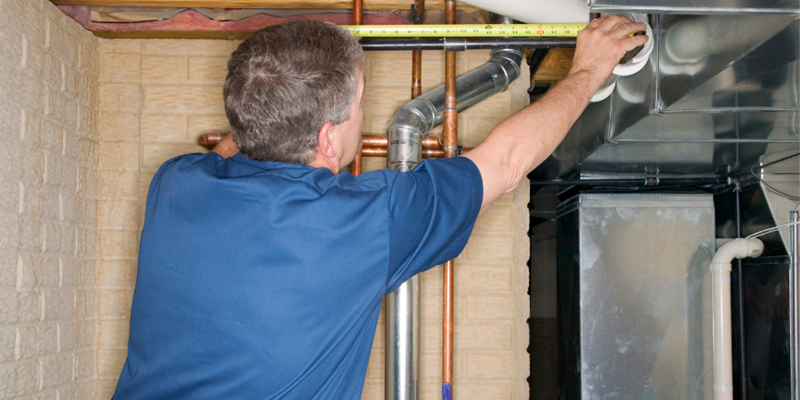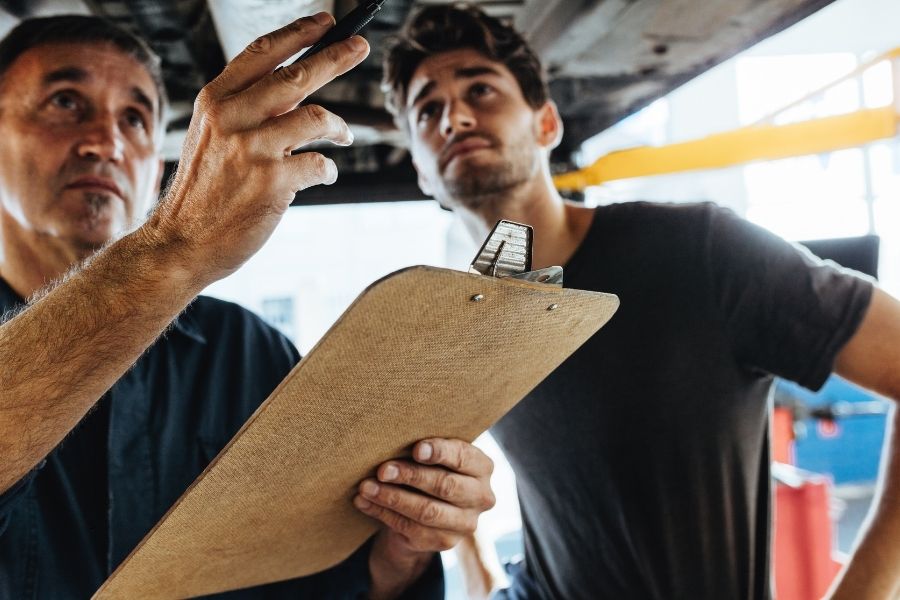
Photo from Canva
In this article:
A hot seller’s market and a dream kitchen easily combine to make a recipe for a quick home offer with no contingencies. Do not, however, waive your right to a home inspection unless you’re purchasing a home for a rock bottom price that’ll afford you sufficient capital reserves to at least replace all of the electric, plumbing, and roofing systems and still come in under budget.
Contingencies have earned a bad name, but home inspections are the exceptions. Beneath that façade of elegant, contemporary wallpaper may lurk deep cracks signifying a foundational issue. That little water spot may signal a plumbing issue. But it could also indicate a mold issue that may require you to strip the room and replace all the drywall. It’s not worth skipping the few hundred dollars for the inspection fee.
Here you’ll learn about what home inspections are, what isn't covered in a home inspection, and what home inspectors look for during the inspection.
What Is a Home Inspection?
A home inspection is neither an insurance policy nor a comprehensive analysis of every flawed feature in a home. Unlike buying a car, prospective homebuyers cannot request a CarFax history report. Instead, they must rely on personal inspection, the seller’s disclosure, and a home inspection. A home inspection only provides buyers a report of visual observations of the home and its accessible features.
If rot or black mold exists beneath the drywall, your home inspection report will not address these matters as they're not visible to the inspector. However, if there are indications that black mold exists, then a home inspector would customarily notate its possibility based entirely on circumspection.
Also worth noting, the level of training and certification to become a home inspector varies from state to state. For instance, military-heavy states such as California and Virginia do not require home inspectors to have a license whereas states that otherwise have fewer regulations, such as South Carolina, have far more stringent licensing and credentialing requirements.
Before hiring a home inspection company, inquire about their licensing and credentials.
What Is Not Covered with a Home Inspection
There are a handful of home issues that most home inspectors do not address because they lack the requisite certifications to do so, such as:
- Asbestos
- Lead Paint
- Infestation
- Radon Gas
- Toxic Mold
While these are big items to overlook, there are plenty more concerns for the inspectors to search for.

Photo from Canva
What Home Inspectors Look for During the Inspection
There are a few key items that every home inspector should check for, so make sure to ask about the following six categories. Failure to do so could potentially cost you thousands of dollars in repairs not covered by home insurance.
1) Plumbing
Most home shoppers know the simple plumbing check tricks, such as turning on the shower and then flushing the toilet to see if it causes any change in water temperature or pressure.
Unfortunately, as with most of the key items on this list, the real plumbing issues are often concealed behind the bathroom tile work, making it challenging to identify problems. A home inspector should check for even the slightest leak or seepage.
If a crawl space exists, then request that the inspector goes beneath the property to check the subflooring for signs of damage. It may feel pushy to ask, but if red flags are lurking down there, it’s much better to know now.
One example: after leaving a home in the hands of tenants for two years, a tiny and seemingly inconsequential (but consistent) leak in one bathroom required the gutting and replacing of both that bathroom and the adjacent bathroom for one unfortunate military spouse. A major repair is one issue you don’t want to deal with between tenants or in the middle of a home sale.
2) Electricity
If you’re buying a distressed property, the damage to the electric wiring systems may be quite visible, particularly if the property was a foreclosure with forced eviction. Homes throughout the country have wires cut by vacating homeowners, their disgruntled and displaced tenants, or vandals taking advantage of the opportunity to have a little fun in an empty house.
If you’re not purchasing a distressed property, then know that just because the lights turn on, it doesn’t mean that fire hazards do not exist. The inspector will look for dangling wires in electrical closets, garages, or even outside the home that reflect obvious signs of DIY electrical work. If the previous homeowners have lived in the property for at least a couple of decades, then make sure to mention this point to your inspector so that he knows the electrical wiring may no longer be up to current building codes. This key fact may help them better identify problem areas that could cost you thousands of dollars to rewire.

Photo from Canva
3) Roofing
The roof is yet another big-ticket item, so you want to be prepared for when you’ll need to replace it. The home inspector's report will tell you if the roof has been replaced since the home was built. The inspector will also include the current condition of the roof. Home inspectors are not required to get up on the roof to inspect it, but they often do. A close-up inspection makes a difference, so inquire as to whether the home inspector you’re considering working with will do this for you.
If the roof has five or more years left on it, then you can request a replacement estimate and budget for its replacement; you’ll have very little chance of reselling the home after a three-year duty station tour without replacing the roof. If the roof is in a considerable state of disrepair, then you may have wiggle room to negotiate either a roof replacement or partial roof credit from the seller at closing.
4) Foundation
One young service member who left the military to move to Washington was excited to purchase a quaint, historic bungalow in a downtown district for approximately $200,000. As he was purchasing in a highly competitive sellers’ market, where houses sold almost the minute they hit the market, he chose to forego the inspection contingency. His decision was not uncommon, as many online resources suggest that skipping the inspection makes your offer look more attractive to the seller. But let the buyer beware, as nothing in the seller’s disclosure hinted at the $100,000 repair bill that this young man would pay within a year of moving into his new home.
When he pursued building a man cave in his unfinished basement, a local contractor told him that his foundation was in such poor condition that it was unsafe to be in the basement, let alone the house itself. With this information provided by a hired contractor, he is now legally required to provide this information in his seller’s disclosure when he moves to sell. Stuck in this situation that no homeowner’s insurance would cover, he borrowed money to make the repairs. When the time came to sell his home about five years later, he sold it for just a little more than what he paid for it initially. His choice to skip a home inspection cost him $100,000.
Avoid being the subject in a grievous story like the one above, and ensure that your inspector thoroughly inspects the cause of any cracks that are visible in walls, the roof, the exterior, and especially in the basement. If their report does not address the visible splits, make sure to ask about the cause. Do not accept house settling as a sufficient response for large cracks. Your inspector will also note if a floor crack extends under a wall and other signs of foundational issues, such as sloped floors, bowed walls, and doors that don’t fit frames.

Photo from Canva
5) Drainage
One thing you don’t want in your new home or yard is run-off water. Don’t wear your finest shoes to walk through your new home. Instead, make sure you trample through the entire yard to test for large squelchy spots that may indicate poor drainage. Drainage is related to land gradations, which a builder’s report may contain for a newer home, but the best way to inspect for this is to visit the property on a rainy day.
Given the foundational issues that drainage and standing water can cause, if you have any reason to doubt the quality of drainage on a property, then check back on MilitaryByOwner’s home listings to find another option for your family. Your home inspector is unlikely to inspect the home during the rain as it will impede their ability to check the exterior of the property and the roof. But they should tell you if there are indications of regular standing water in any area of the property.
6) Appliances and Heating/Air Conditioning (HVAC)
Home inspectors note the ages and performance of major appliances such as the water heater, oven, and HVAC system. They will note if any show rust or other damage indicating necessary repairs or replacement. The inspector will check whether the unit operates correctly, when it was last serviced, and issues such as if a larger home only has one A/C unit (which could be a concern for higher energy costs).
Other Reasons for a Home Inspection
If there is an inspection contingency.
When the success of the home sale is dependent on the results of the inspection, it’s called an inspection contingency. It allows you, the buyer, to walk away if the report reveals anything alarming about the property.
If you’re purchasing a new build.
Although new construction needs to meet local building code, a home inspection can be helpful in recognizing any flaws or potential kinks with the new house.
If you’re looking for an informative home inspection.
Even if the contract is not contingent on the inspector’s finding, meaning that the sale will move forward regardless of their report, an informative home inspection can be a helpful tool when preparing to move into a new home and budget for potential maintenance.
Keep in mind that the purpose of a home inspection is to find out if there are severe structural or mechanical defects. Understanding what your home insurance policy will cover is crucial. For example, an issue like old electrical wiring might be a red flag that prevents you from insuring the house, and you’d be unable to close on your home sale if you don’t have insurance coverage. Thankfully, with an experienced buyer’s agent at your side, you’ll be able to negotiate with the seller on any prominent issues the inspector brings to your attention.
As it’s one of the most exhaustive financial transactions you’ll make, it’s essential to know what you're getting into when you buy a home. Having a home inspection can help provide a clear list of responsibilities associated with owning a home.
To learn more about closing on your next home, grab our free guide below!

